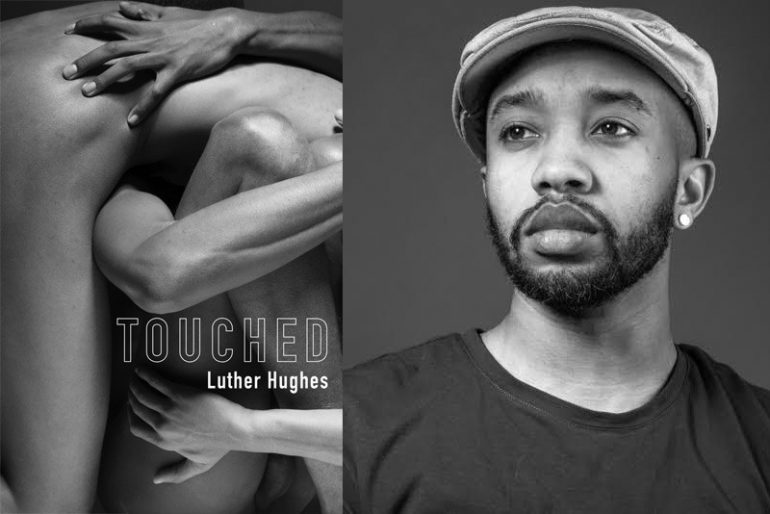A review of Touched (Sibling Rivalry Press) by Luther Hughes
It is one of the peculiarities of language that a single phrase can often mean different, often contradictory things. To lay a hand on someone, for example, can be a gesture of intimacy as well as violence; in the context of church, it symbolizes the conference of spiritual power. The cover of Touched, Luther Hughes’ collection of poems, shows bodies wrapped around bodies, many hands in many places. It’s a pentecostal image, and the spirit has indeed descended into these poems, giving them music and risk, beauty and terror. These poems present hands as erotic messengers and furious weapons. Here are lines from the opening poem, “Hominal”:
See the fist. Like shale. Meeting spine. Meaning slay. Stretch me. Relax. Something about skinned alive.
The short lines and staccato sentences intensify the senses of danger and delight that course through the poem. Hughes is a master of rhythm, of the way a line, broken or held, can bring the whole body to attention. In “Bird With Two Backs” he alternates between a slightly unusual syntax (‘I fanned my naked into/the moon’s milked eye.’) and the more straightforward ‘My hands curled a dead dahlia.’ In both cases the images are strong; the varied music serves to make them stronger. These are poems that require strength as they explore, among other things, the difficult material of incest and sexual abuse.
In “Clenched,” a poem about hands inside the body, the last line, ‘I. I. I.’ is both a song of self and a cry for a beloved. Those ‘I’s stand like steel beams holding the poem up, the way a self carries around histories personal, political, spiritual, sexual. ‘I was bloodlust/revisited. I – pieces, slaughterhouse…/Revisited.’ Hughes revisits moments of tenderness and trauma, often in the same poem, sometimes even in the same line. The poem “Tenderness,” with its meditation on the death of a brother and the death of a bird, calls to mind both the spiritual “His Eye is On the Sparrow” and the words of Matthew 10:29: ‘not one sparrow will fall to the ground apart from your Father.’
Touched is, among other things, an aviary. The birds that inhabit these poems are at once spectral and literal, scriptural and literary. Poe’s raven, Ted Hughes’ crow, Gwendolyn Brooks’ “Light and Diplomatic Bird,” Charlie ‘Yardbird’ Parker flock behind the lines. In “Self-Portrait as Crow,” Hughes writes:
...My brothers and sisters raise their wings to the crowgods, I watch the murder surround.
He is riffing on the double meaning of ‘murder’ as both a gathering of crows and the malicious taking of life. This poem appears between “Trayvon” and “Boy,” and makes a kind of chorus with those poems, a chorus of lamentation and remembrance, of prophetic witness and elegiac magic. ‘Boys like you are beginning to look too much like/tombstones than boys,’ reminds me that some scholars suppose poetry began as epitaph, inscriptions on tombstones. Touched carries on that tradition, but it also very much displays a lust for life. This book will reward whatever hands pick it up.





